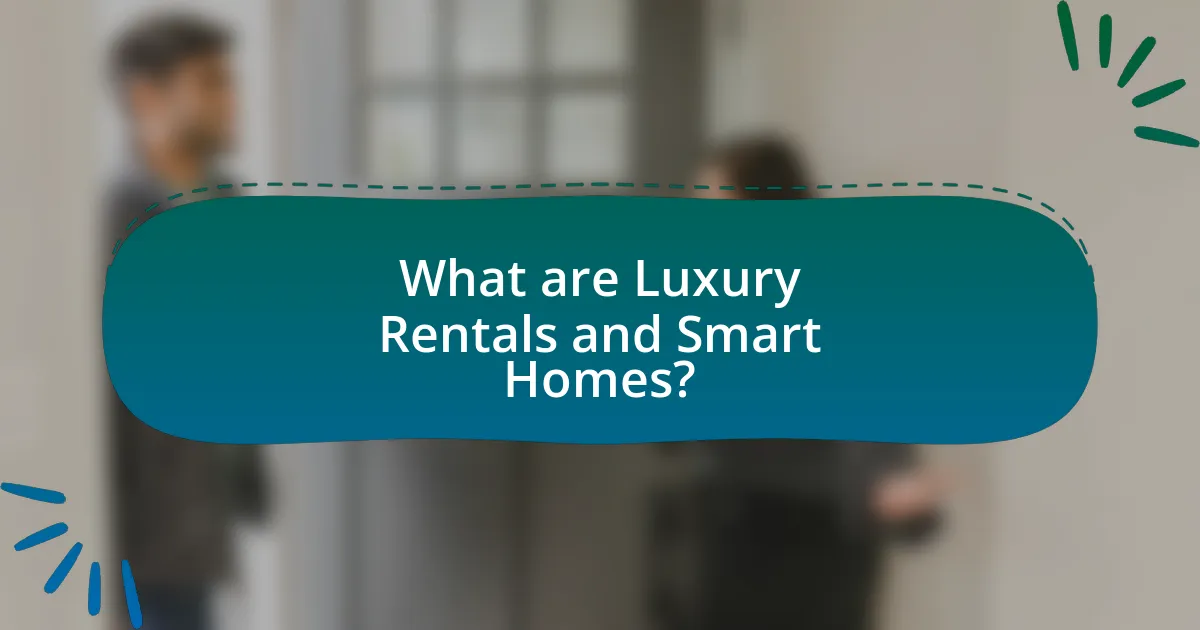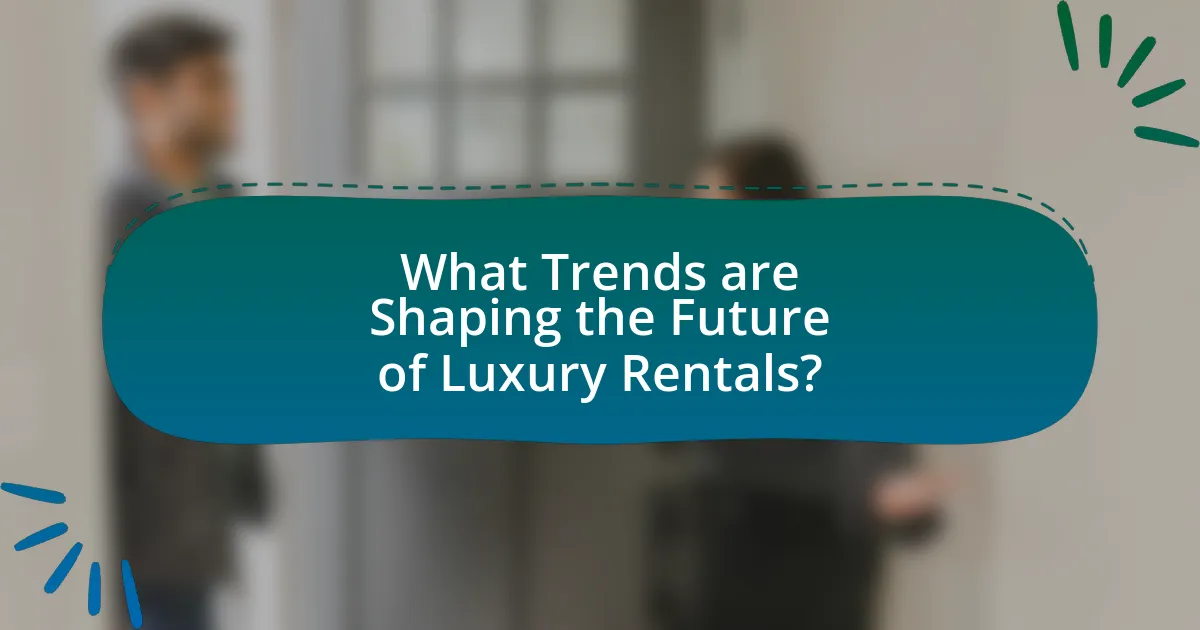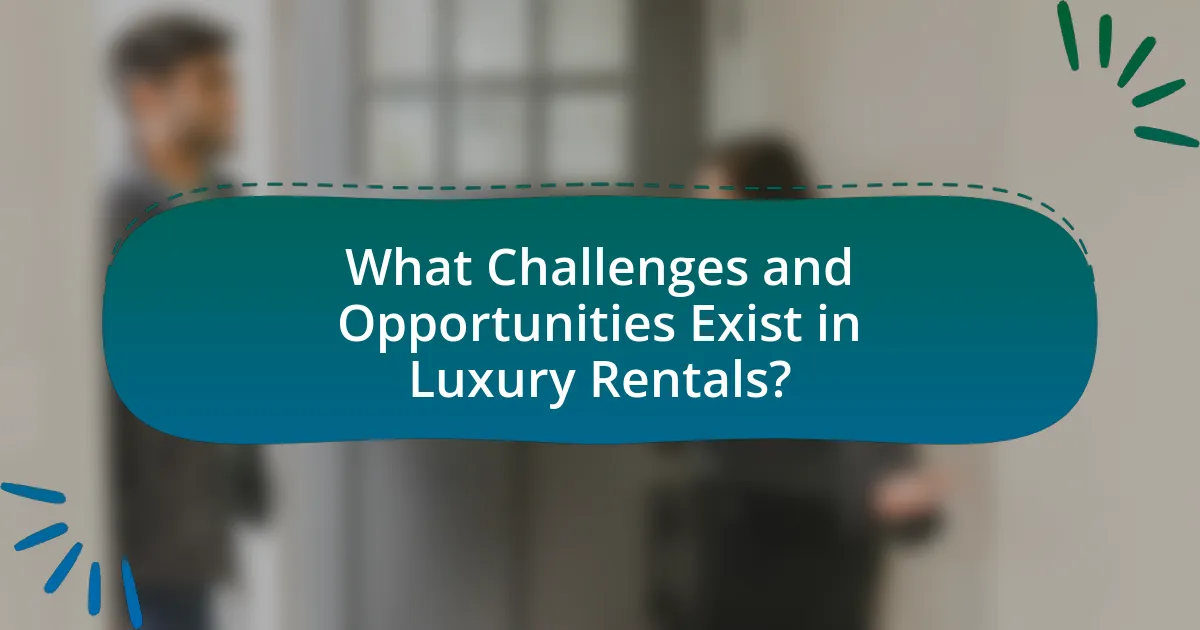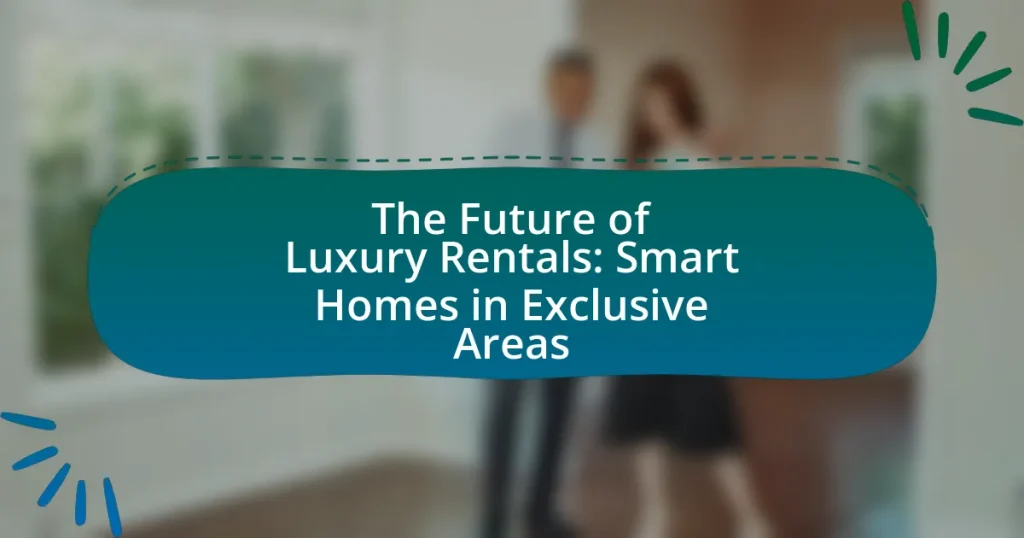The article focuses on the evolving landscape of luxury rentals, emphasizing the integration of smart home technology in exclusive areas. It defines luxury rentals as high-end properties that offer premium amenities and services, distinguishing them from traditional rentals through superior features and pricing. Key topics include the characteristics that define luxury rentals, the significance of location and exclusivity in determining rental prices, and the growing demand for smart home technologies among affluent renters. Additionally, the article explores demographic shifts influencing the luxury rental market, the challenges and opportunities faced by property owners, and best practices for managing smart home systems in luxury rentals.

What are Luxury Rentals and Smart Homes?
Luxury rentals are high-end properties available for short-term or long-term lease, often featuring premium amenities and services that cater to affluent clients. Smart homes are residences equipped with advanced technology that allows for automation and remote control of various systems, such as lighting, security, and climate control. The integration of smart technology in luxury rentals enhances the living experience by providing convenience, energy efficiency, and increased security, making these properties more appealing to discerning renters. According to a report by Statista, the global smart home market is projected to reach $174 billion by 2025, indicating a growing trend in the adoption of smart technology in residential properties.
How do luxury rentals differ from traditional rentals?
Luxury rentals differ from traditional rentals primarily in their level of amenities, location, and pricing. Luxury rentals typically offer high-end features such as smart home technology, premium furnishings, and exclusive locations in affluent neighborhoods, while traditional rentals often provide basic accommodations without these enhancements. For instance, luxury rentals may include services like concierge, private pools, and high-end appliances, which are not standard in traditional rentals. Additionally, the price point for luxury rentals is significantly higher, reflecting the added value of these features and the desirability of their locations.
What features define a luxury rental property?
Luxury rental properties are characterized by high-end amenities, superior location, and exceptional design. These properties often feature state-of-the-art technology, such as smart home systems that control lighting, temperature, and security, enhancing convenience and comfort. Additionally, luxury rentals typically offer spacious layouts, premium materials like marble or hardwood flooring, and high-quality appliances. Exclusive locations, often in prestigious neighborhoods or with scenic views, further elevate the desirability of these properties. According to a report by Knight Frank, luxury rental markets have seen a significant increase in demand, particularly for properties that incorporate smart technology, reflecting a shift in tenant preferences towards modern living solutions.
Why are smart homes becoming a part of luxury rentals?
Smart homes are becoming a part of luxury rentals due to the increasing demand for convenience, security, and energy efficiency among affluent renters. These technologically advanced homes offer features such as automated lighting, climate control, and security systems that enhance the living experience. According to a report by the National Association of Realtors, 77% of homebuyers consider smart home technology a valuable feature, indicating a strong market preference. Additionally, luxury rentals equipped with smart home technology can command higher rental prices, as they appeal to tech-savvy individuals seeking modern amenities.
What is the significance of exclusive areas in luxury rentals?
Exclusive areas in luxury rentals are significant because they offer enhanced privacy, security, and access to high-end amenities, which are highly valued by affluent renters. These locations often feature upscale neighborhoods with low crime rates, exclusive services, and proximity to luxury shopping, fine dining, and cultural attractions. For instance, properties in exclusive areas typically command higher rental prices due to their desirability, with some neighborhoods seeing rental rates increase by over 20% compared to less exclusive areas. This demand is driven by the lifestyle and status associated with living in such prestigious locations, making them a key factor in the luxury rental market.
How do location and exclusivity impact rental prices?
Location and exclusivity significantly influence rental prices, with properties in prime locations commanding higher rates due to demand and desirability. For instance, luxury rentals in metropolitan areas or affluent neighborhoods often see prices increase by 20% to 50% compared to similar properties in less desirable locations. Exclusivity further elevates rental prices, as limited availability in high-end markets creates a competitive environment, driving prices up. According to a report by Zillow, homes in exclusive areas can appreciate at rates exceeding 10% annually, reflecting the premium placed on both location and exclusivity in the luxury rental market.
What amenities are typically found in exclusive areas?
Exclusive areas typically feature high-end amenities such as private pools, fitness centers, concierge services, and advanced security systems. These amenities cater to the lifestyle of affluent residents, providing convenience and luxury. For instance, private pools offer a secluded space for relaxation, while fitness centers equipped with state-of-the-art equipment promote health and wellness. Concierge services enhance the living experience by assisting with various needs, from reservations to personal errands. Advanced security systems ensure safety, often including gated entrances and surveillance technology, which are common in upscale neighborhoods.

What Trends are Shaping the Future of Luxury Rentals?
The future of luxury rentals is being shaped by the integration of smart home technology, sustainability, and personalized experiences. Smart home technology enhances convenience and security, with features like automated lighting, climate control, and advanced security systems becoming standard in high-end properties. Sustainability is increasingly important, as luxury renters seek eco-friendly options, leading to the adoption of energy-efficient appliances and sustainable building materials. Additionally, personalized experiences, such as tailored concierge services and bespoke amenities, are becoming essential to meet the unique preferences of affluent clients. These trends reflect a shift towards a more tech-savvy, environmentally conscious, and customer-centric luxury rental market.
How is technology influencing luxury rental properties?
Technology is significantly influencing luxury rental properties by integrating smart home features that enhance convenience, security, and energy efficiency. Smart home systems, such as automated lighting, climate control, and security cameras, provide tenants with personalized living experiences while also allowing property owners to manage their assets more effectively. For instance, a study by the National Association of Realtors found that 77% of homebuyers consider smart home technology a desirable feature, indicating a strong market preference that luxury rentals are increasingly catering to. Additionally, the implementation of IoT devices enables real-time monitoring and management of property conditions, which can lead to reduced maintenance costs and improved tenant satisfaction.
What smart home technologies are most popular in luxury rentals?
Smart home technologies most popular in luxury rentals include smart lighting systems, advanced security systems, smart thermostats, and integrated home automation platforms. These technologies enhance convenience, security, and energy efficiency, which are highly valued in luxury living. For instance, smart lighting systems allow for customizable ambiance and energy savings, while advanced security systems provide real-time monitoring and alerts, ensuring tenant safety. According to a report by the National Association of Realtors, 70% of luxury home buyers prioritize smart home features, indicating a strong demand for these technologies in high-end rentals.
How do these technologies enhance the rental experience?
Technologies enhance the rental experience by providing increased convenience, efficiency, and personalization for tenants. Smart home features, such as automated lighting, climate control, and security systems, allow renters to customize their living environment to suit their preferences, leading to greater satisfaction. Additionally, platforms that facilitate seamless communication between landlords and tenants streamline processes like maintenance requests and payment transactions, reducing response times and improving overall service quality. According to a study by the National Apartment Association, properties equipped with smart technologies can command higher rental prices and attract more tenants, demonstrating the tangible benefits of these innovations in the luxury rental market.
What demographic shifts are affecting luxury rental markets?
Demographic shifts affecting luxury rental markets include the increasing number of affluent millennials and Gen Z individuals seeking urban living, as well as a growing trend of remote work that allows high-income earners to choose locations based on lifestyle rather than proximity to their workplaces. According to a 2021 report by Knight Frank, the number of high-net-worth individuals aged 30 and under has risen significantly, influencing demand for luxury rentals in metropolitan areas. Additionally, the rise of digital nomadism has led to a preference for flexible, high-end rental options in desirable locations, further shaping the luxury rental landscape.
How are millennials and Gen Z influencing luxury rentals?
Millennials and Gen Z are significantly influencing luxury rentals by prioritizing technology, sustainability, and unique experiences. These generations favor smart home features, such as automated systems and energy-efficient appliances, which enhance convenience and reduce environmental impact. According to a 2022 report by the National Association of Realtors, 75% of millennials consider smart home technology a key factor in their rental decisions. Additionally, they seek properties that offer personalized experiences and community engagement, driving landlords to adapt their offerings to meet these preferences. This shift is reshaping the luxury rental market to align with the values and expectations of younger renters.
What preferences do younger renters have for smart homes?
Younger renters prefer smart homes that offer convenience, energy efficiency, and enhanced security features. They are particularly interested in smart devices that can be controlled remotely, such as smart thermostats, lighting systems, and security cameras. According to a survey by the National Association of Realtors, 77% of millennials expressed a desire for smart home technology in their rental properties, highlighting the importance of tech integration in their living spaces. Additionally, younger renters value the ability to customize their smart home systems to fit their lifestyle, which includes features like voice-activated assistants and automated home management systems.

What Challenges and Opportunities Exist in Luxury Rentals?
Luxury rentals face challenges such as high maintenance costs and fluctuating demand, while opportunities include the integration of smart home technology and the growing interest in unique, experiential stays. High maintenance costs arise from the need to uphold luxury standards, which can deter some investors. Fluctuating demand is influenced by economic conditions and travel trends, impacting occupancy rates. Conversely, the integration of smart home technology enhances guest experiences and can justify premium pricing, as evidenced by a 2022 report from Statista indicating that 70% of travelers prefer accommodations with smart features. Additionally, the increasing desire for unique experiences drives demand for luxury rentals in exclusive areas, presenting a significant opportunity for growth in this market segment.
What are the main challenges facing luxury rental property owners?
The main challenges facing luxury rental property owners include high maintenance costs, fluctuating market demand, and regulatory compliance. High maintenance costs arise from the need to uphold premium standards in property upkeep, which can significantly impact profitability. Fluctuating market demand is influenced by economic conditions and consumer preferences, making it difficult for owners to predict rental income. Regulatory compliance involves navigating complex local laws and regulations, which can vary widely and impose additional costs or restrictions on property management. These challenges require owners to be proactive and adaptable to maintain their investments effectively.
How can property owners address maintenance and technology issues?
Property owners can address maintenance and technology issues by implementing smart home systems that provide real-time monitoring and automated alerts for maintenance needs. These systems can track the performance of appliances, HVAC systems, and security features, allowing property owners to proactively manage repairs and upgrades. For instance, a study by the National Association of Realtors found that 70% of homebuyers are interested in smart home technology, indicating a growing demand for properties equipped with such features. By investing in smart technology, property owners not only enhance the living experience but also streamline maintenance processes, ultimately increasing property value and tenant satisfaction.
What legal considerations must be taken into account for smart homes?
Legal considerations for smart homes include data privacy, security compliance, and liability issues. Data privacy laws, such as the General Data Protection Regulation (GDPR) in Europe, require that personal data collected by smart devices be handled with explicit consent and proper safeguards. Security compliance involves ensuring that smart home devices meet industry standards to protect against hacking and unauthorized access, as evidenced by the rise in cyberattacks targeting IoT devices. Liability issues arise when determining responsibility for damages caused by malfunctioning smart devices, which can complicate insurance claims and legal accountability.
What opportunities can arise from the integration of smart homes in luxury rentals?
The integration of smart homes in luxury rentals creates opportunities for enhanced tenant experiences, increased property value, and streamlined management processes. Smart home technology, such as automated lighting, climate control, and security systems, provides tenants with convenience and customization, leading to higher satisfaction rates. According to a report by the National Association of Realtors, properties equipped with smart technology can command a 5-10% premium in rental prices, thus increasing overall property value. Additionally, property managers benefit from smart home systems through improved energy efficiency and reduced maintenance costs, as these technologies often include monitoring capabilities that alert managers to issues before they escalate.
How can smart home features attract more renters?
Smart home features can attract more renters by enhancing convenience, security, and energy efficiency. These features, such as smart thermostats, security cameras, and automated lighting systems, provide renters with a modern living experience that aligns with their tech-savvy lifestyles. According to a survey by the National Association of Realtors, 77% of millennials consider smart home technology an important factor when choosing a rental property. This indicates a strong demand for such amenities, making properties equipped with smart technology more appealing and competitive in the rental market.
What potential for increased revenue exists with luxury smart rentals?
Luxury smart rentals have significant potential for increased revenue due to their appeal to affluent consumers seeking convenience and advanced technology. The integration of smart home features, such as automated lighting, climate control, and security systems, enhances the guest experience, allowing property owners to command higher rental prices. According to a study by the National Association of Realtors, properties with smart technology can increase rental income by up to 20% compared to traditional rentals. Additionally, luxury smart rentals often attract a higher occupancy rate, as they cater to tech-savvy travelers who prioritize comfort and efficiency, further boosting revenue potential.
What are the best practices for managing luxury rentals with smart home technology?
The best practices for managing luxury rentals with smart home technology include integrating user-friendly systems, ensuring robust security measures, and providing comprehensive guest support. User-friendly systems, such as smart thermostats and lighting controls, enhance guest experience and convenience, leading to higher satisfaction rates. Robust security measures, including smart locks and surveillance cameras, protect both the property and guests, reducing liability risks. Comprehensive guest support, facilitated by smart home technology, allows for quick troubleshooting and assistance, which is crucial for maintaining high service standards in luxury rentals. These practices are validated by industry trends showing that properties equipped with smart technology can achieve up to a 20% increase in rental income due to enhanced guest experiences and security features.
How can property owners ensure a seamless smart home experience for renters?
Property owners can ensure a seamless smart home experience for renters by implementing user-friendly smart technology and providing comprehensive support. This includes selecting devices that are compatible with various platforms, such as smart thermostats, lighting, and security systems, which can be easily controlled via smartphones or voice assistants. Additionally, property owners should offer clear instructions and troubleshooting assistance to renters, ensuring they can effectively utilize the technology. Research indicates that 70% of renters prefer homes equipped with smart technology, highlighting the importance of these features in attracting tenants. By prioritizing compatibility and support, property owners can enhance the overall rental experience and satisfaction.
What maintenance tips should be followed for smart home systems in rentals?
Regularly update the software and firmware of smart home devices to ensure optimal performance and security. This practice helps protect against vulnerabilities and enhances functionality, as manufacturers often release updates that fix bugs and improve features. Additionally, routinely check the connectivity of devices to the home network, as weak signals can lead to performance issues. It is also essential to clean and maintain physical devices, such as cameras and sensors, to ensure they operate effectively. Lastly, document all maintenance activities and device settings for future reference, which aids in troubleshooting and ensures consistency in device management.

